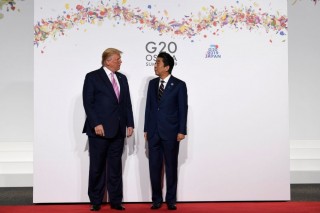Loading
Search
▼ U.S., Japan Edge Closer to Limited Trade Pact
- Category:Event
Accord would give Trump a modest win amid diminished expectations for a landmark deal with China
WASHINGTON—The U.S. and Japan are working to hammer out a limited trade pact that would pave the way for more U.S. farm exports to Japan, while dropping the threat of U.S. tariffs on Japanese cars.
Such an accord with Japan would give President Trump a modest win amid diminished expectations for a landmark deal with China and uncertainty over congressional ratification of the administration’s updated deal with Mexico and Canada.
U.S. Trade Representative Robert Lighthizer met Japanese Economic Revitalization Minister Toshimitsu Motegi in Washington on Thursday as the negotiations shift into high gear this week. One of the options is hammering out a deal that wouldn’t need ratification in Congress, according to people familiar with the talks.
“I think we’re getting close to something with Japan,” Sen. Chuck Grassley (R., Iowa), the chairman of the Senate Finance Committee, told reporters Wednesday.
Mr. Motegi sounded a similar note in Tokyo this week, saying “there isn’t much daylight left” between the two sides in the talks.
Mr. Trump and Japanese Prime Minister Shinzo Abe are both scheduled to attend gatherings of world leaders in August and September, which could provide venues for a final deal to emerge.
President Trump pulled the U.S. out of the unratified 12-nation Trans-Pacific Partnership, which included Japan, on his first working day in office in 2017. A revised TPP took effect last year without the U.S., and now U.S. farmers are complaining as member countries—including Australia, Canada and New Zealand—as well as the European Union get greater access to Japan’s long-protected markets for beef, pork and dairy products.
American farmers are also hurting from diminished sales to China, which has cut U.S. agricultural purchases in retaliation for Mr. Trump’s tariffs on more than $250 billion in Chinese imports.
“Agriculture suddenly rose in prominence on the U.S. agenda because U.S. farmers have taken such a hit from foreign retaliation against Trump’s trade policies,” said Jeffrey Schott, a trade expert at the Peterson Institute for International Economics in Washington.
Mr. Trump said in May that the two sides would seek progress on a deal after Japan’s July parliamentary elections, which favored Mr. Abe’s party.
Mr. Lighthizer has told Congress he might try to achieve a relatively quick deal with Japan as a prelude to pursuing a much more comprehensive trade agreement—one similar to the U.S.-Japan framework under the TPP.
“The administration is seeking an early outcome from the negotiations to ensure, among other things, that U.S. agricultural exporters have a level playing field in terms of access to Japan’s market,” Mr. Lighthizer said in response to written questions from Sen. Ron Wyden of Oregon, the top Democrat on the Senate Finance Committee.
It wasn’t immediately clear from Mr. Lighthizer’s congressional comments whether the initial deal would require the U.S. to lower tariffs on Japanese products in response to Japan lowering its barriers to American agricultural goods, or whether the administration would submit an early deal with tariff cuts for ratification in Congress.
A spokeswoman for Mr. Lighthizer declined to comment on the talks.
“The administration seeks to pursue other, much broader objectives for a comprehensive trade agreement with Japan,” Mr. Lighthizer said, adding that he’s “committed to working closely with Congress” and will follow a 2015 trade law.
The people familiar with the talks say negotiators are looking at the possibility of using existing tariff authorities, including a provision of the 2015 trade law, to trim tariffs on Japanese goods and seal a deal without a vote from lawmakers.
Congress over the years has delegated broad tariff authority to the president, and Mr. Trump, who has frequently raised tariffs under special laws, could also seek to use such laws to lower tariffs, they say.
Mr. Trump has repeatedly questioned U.S. military commitments to Japan. For Japan, a key goal of any quick trade deal would be cementing ties with Washington, as well as getting exempted from Mr. Trump’s possible auto-import tariffs, which the administration is expected to revisit later this year.
Yet Japanese officials are also seeking broad tariff cuts from the U.S., in part to ease passage of a deal in the country’s parliament.
“On the Japanese side, they’re saying, we can do that, but we have to get something in return,” Mr. Schott said. The original TPP would have eliminated the U.S. tariff on Japanese car imports, but the Trump administration, which has been reluctant to reduce tariffs, would likely face complaints from Detroit if it eliminated the car duty without winning concessions designed to narrow the U.S. auto-industry trade deficit with Japan.
Sen. Pat Toomey, a Pennsylvania Republican on the Senate committee that oversees trade, said lawmakers would enthusiastically welcome a deal that opens up markets in Japan but would also expect to get a vote on the deal.
“That would clearly have to come to Congress,” Mr. Toomey said.
By
William Mauldin
- August 2, 2019
- Comment (0)
- Trackback(0)


